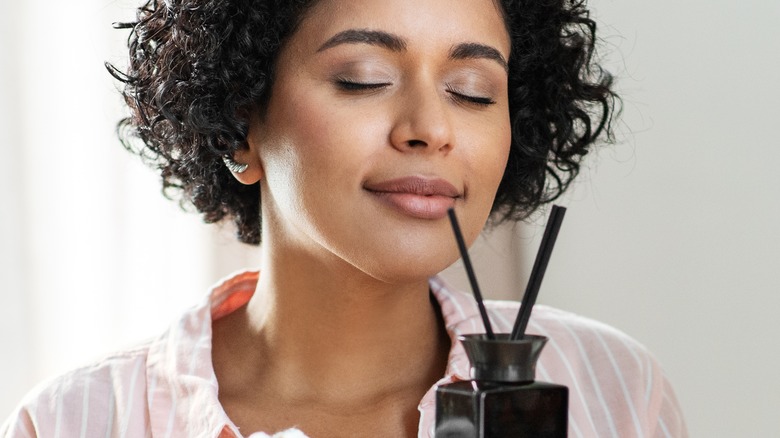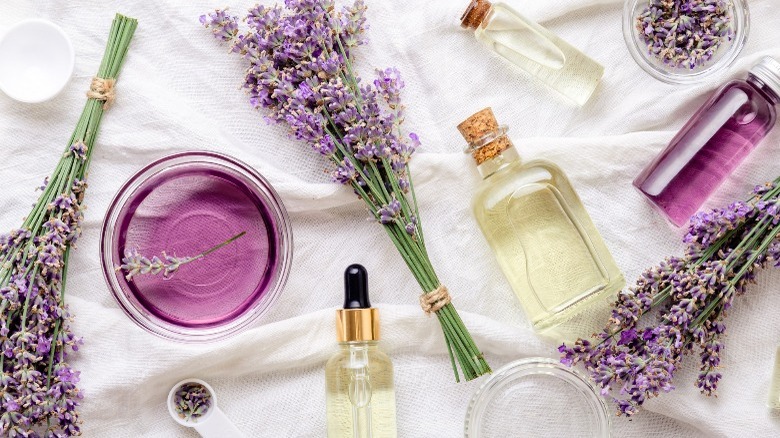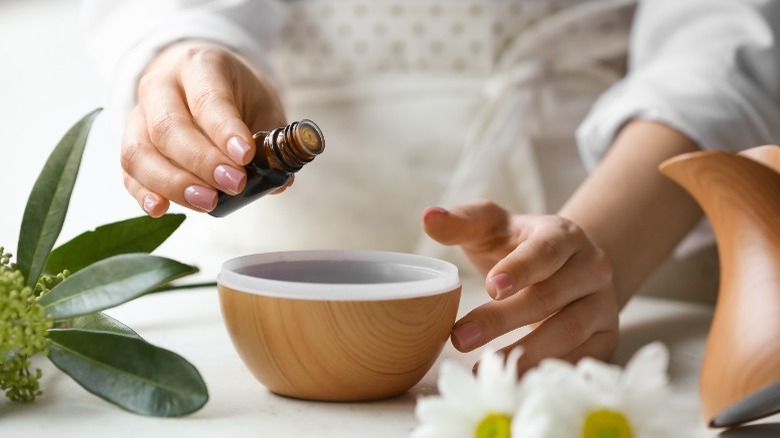The Best Essential Oil Combinations For Stress Relief
When you're stressed out, your mind and body seem to rebel against you. Irritability, anxiety, depression, headaches, and insomnia are all potential symptoms of stress, as reported by The American Institute of Stress. It may also have an impact on your central nervous and endocrine systems, and on your heart, digestion, and even muscles.
One way you can help reduce stress is through aromatherapy, which "taps into the healing power of scents from essential oils . . . to balance your mind, body, and spirit," Dr. Marylynn Wei explained to Psychology Today. "Studies have shown that specific essential oils used in aromatherapy can help relieve stress, relax the body, and promote better sleep."
Essential oils are derived from the parts of plants that contain fragrance elements, resulting in a concentrated scent. "When inhaled, the scent molecules in essential oils travel from the olfactory nerves directly to the brain and especially impact the amygdala, the emotional center of the brain," noted Johns Hopkins Medicine.
Find an essential oil combination that works
There are several essential oils that are known to help relieve stress, as well as anxiety, including lavender, bergamot, mandarin, roman chamomile, and clary sage.
"Lavender essential oil has anxiolytic, or anxiety-reducing properties, and has been well studied throughout the world," Dawn Langley-Brady, a certified clinical aromatherapist, shared on Oprah Daily. Newsweek noted that bergamot is, "both calming and energizing, and great for relieving repressed emotions and soothing anxiety." Mandarin contains anxiety-reducing properties, and has the capability of helping with insomnia, and improving your mood, according to Oprah Daily. The outlet also said that roman chamomile has a calming effect. And, as stated by Psychology Today, clary sage helps you relax, and may have antidepressant qualities.
All of the above oils are good for blending, allowing you to create a custom anti-stress blend that appeals to you. "Blending essential oils is all about inhaling," shared the American College of Healthcare Sciences. "[Begin] by experimenting with combining essential oils that you love from the very first inhale."
They recommend placing a few drops of each of the stress-relieving oils you prefer on a strip of paper, then fanning them in front of your nose. You can try the strips in different combinations until you find the one that most appeals to you (via the American College of Healthcare Sciences). "Stop, inhale, and let the aroma lead you to your next choice." You can store your blend in a bottle to use for stress-relieving aromatherapy.
Turning essential-oil blends into aromatherapy
Once you've decided on the essential-oil blend, the scent can be conveyed through a variety of aromatherapy mediums. If applying the oil directly to the skin, diluting it with a carrier oil is best, states the American College of Healthcare Sciences. "Begin with a high dilution ratio — we recommend 24 drops in four ounces of carrier oil. When it comes to aromatherapy, less is more!" Johns Hopkins Medicine suggests olive, jojoba, or coconut oil for the carrier oil if you'll be massaging it into the skin.
Johns Hopkins Medicine notes that aromatherapy accessories are a good way to carry the benefits of your stress-relieving oil with you. Bracelets, necklaces, pendants, chains, car diffusers, and other accessories are specially made with materials that absorb the essential oil blend and release the scent throughout the day.
"The quickest way to change one's mood is through smell, thus essential oil is an excellent way to reduce anxiety and support relaxation," according to Dr. Yufang Lin via Women's Health.


